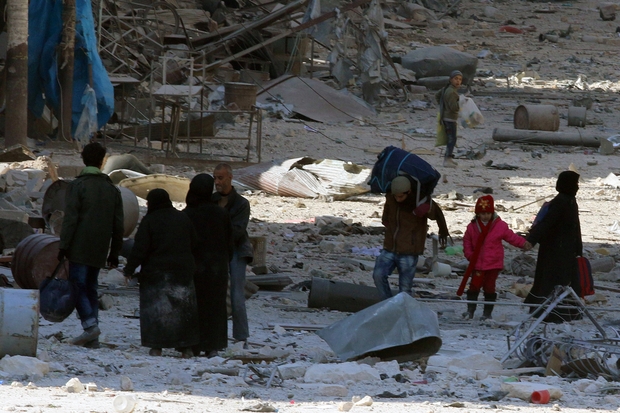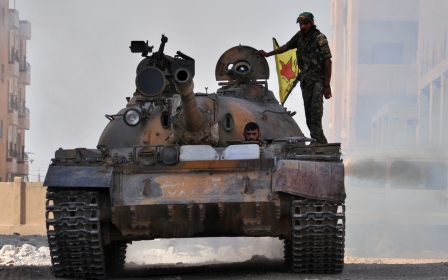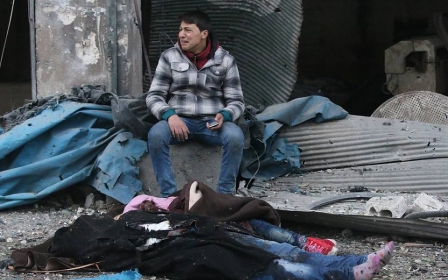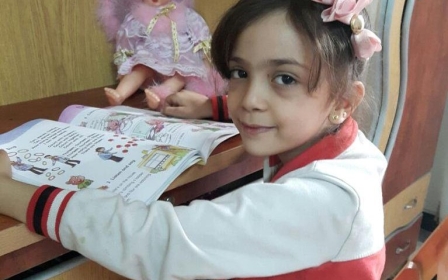Siege of Aleppo: How can the world make up for how much we have failed Bana Alabed?
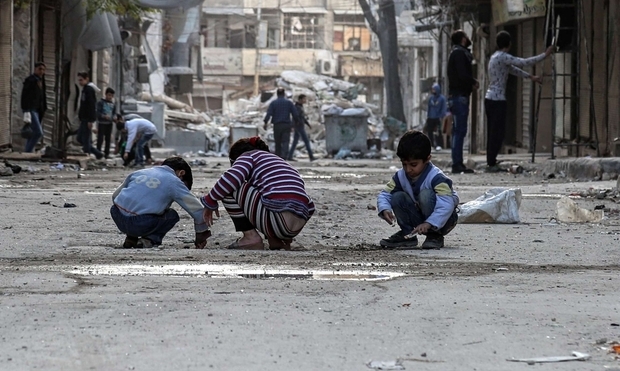
‘These are appalling stories. Sometimes people say that to be on the safe side you should divide them by 10, or 100 or 200; but divide them as we may, they are still stories about atrocities.’
– Anna Politkovskaya, writing from Chechnya in 2000
While eastern Aleppo is falling to devastation at the hands of pro-regime troops, some people have focused on debating numbers and little girls. Specifically, some have questioned the estimated total of 250,000 people besieged by the regime in eastern Aleppo quoted by the UN and organisations such as Human Rights Watch and Amnesty International.
Debating numbers in the midst of a humanitarian catastrophe deflects from the real issues at hand: the atrocities committed against the people of east Aleppo
Debating numbers in the midst of a humanitarian catastrophe deflects from the real issues at hand, which are the atrocities committed, as you read this, against the people of east Aleppo.
Questioning figures isn’t a particularly original method to discredit narratives of suffering, nor is it restricted to Syria. Palestinians, for example, are all too familiar with the absurdity of debating numbers while people face besiegement and death.
Every person who has been subjected to systematic violence knows that counting bodies at a singular moment in time does not tell us all we need to know about patterns of violence. It says nothing about the reality of oppression, siege, starvation, torture, pain or death.
What wars do to us
War seems to do this to human beings; to make them into bodies to be categorised and counted, as if the explanation for their suffering is a mystery to be unraveled through the act of counting and labelling. This is nonsense and morally indefensible.
Patterns of violence matter, certainly when oppression, rape, starvation, besiegement, torture, and murder have been used as weapons of war by a regime that presents itself as the only stable alternative to the brutal sectarianism that it has engineered.
It has weaponised numbers as a means to sow doubt about the scale of its violence, in order to underline its narrative and to diminish the appeals of those who have suffered at its hands.
A small person's tragedy
‘In paintings, as in life, detail is what matters most. It is the detail which gives the measure of our humanity. How we react to the tragedy of one small person accurately reflects our attitude towards a whole nationality; and increasing the numbers doesn’t change much.’
– Anna Politkovskaya, writing from Chechnya in 2000
A number of people ranging from skeptics to pro-regime pundits have questioned the validity of the messages shared by Bana Alabed on Twitter. Bana is seven-years old and, with the help of her mother, has been tweeting about her daily life in East Aleppo.
Hers is a single story, enveloped in the wider context of the Syrian war, as are the stories of countless other children whose reality has been marked by war.
In 2002, in the midst of the Second Palestinian Intifada, the Israeli Defence Forces invaded Ramallah and besieged Yasser Arafat in his compound. My family home was in the area between Arafat’s compound and the military settlement from which the army invaded the city. As a result, a tank and sniper unit were stationed in the residential building opposite our home, and we lived under a strict curfew.
Would the world have believed my sister and I had we been able to tweet about our experience?
I was 10 at the time, and my sister was a few months younger than Bana Alabed is today. I remember how her eyes, otherwise downcast, flickered with terror when a sniper bullet ricocheted off the wall outside our bedroom, when aircrafts flew over, and when the nearby electricity tower was bombed.
I remember reading Harry Potter and the Prisoner of Azkaban with her at night, on a thin mattress in one of the safer rooms in our home, the pages lit up by the dim light of a candle until our father came over and said the candlelight would ruin our eyes. I waited for everyone to go to sleep and resumed reading in secret – I was too curious about who this Sirius Black was, my mind craving for that beautiful distraction from my new reality.
That book was one of the few things I took with me when we fled to the Netherlands later that year. Its pages have since turned yellow and smell like a relic of the past. I wonder, would the world have believed my sister and I had we been able to tweet about our experience?
Distractions and failure
Bana Alabed doesn’t own paper copies of the Harry Potter books, but after reaching out to JK Rowling she was sent electronic copies of the series to distract her from her own reality. If she is lucky, and I hope with all my heart that she is, she might one day look back at those electronic copies as relics of her past.
If she is lucky, she might also be able to look back at those who questioned and bullied her when she was already so terrified, and at the countless videos livestreaming the death and exodus of the people of east Aleppo.
I wonder, how can the world ever make up for how much we have failed her, for how much we have failed Syria?
- Samar Batrawi is a London-based policy analyst at Al-Shabaka, an independent Palestinian think-tank, and a PhD candidate and teaching assistant at King’s College London. She has previously worked for the Women’s Centre for Legal Aid and Counselling in Ramallah and the Clingendael Institute for International Relations in The Hague. You can follow her on Twitter @SamarBatrawi
The views expressed in this article belong to the author and do not necessarily reflect the editorial policy of Middle East Eye.
Photo: Children play with bomb shrapnel and rocks in the Ferdous area of Aleppo (MEE/Malek al-Shimale)
New MEE newsletter: Jerusalem Dispatch
Sign up to get the latest insights and analysis on Israel-Palestine, alongside Turkey Unpacked and other MEE newsletters
Middle East Eye delivers independent and unrivalled coverage and analysis of the Middle East, North Africa and beyond. To learn more about republishing this content and the associated fees, please fill out this form. More about MEE can be found here.



